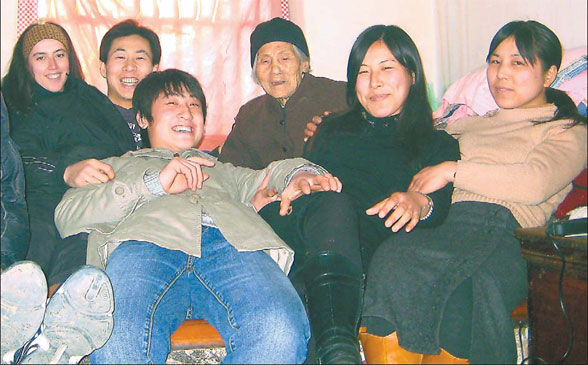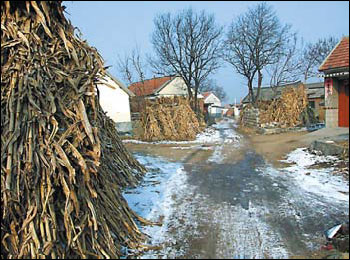Alison Klayman (first from left) with her host family during her visit to a Shandong village. Photos courtesy of Alison Klayman
Yesterday in Beijing I celebrated the Lantern Festival, the 15th day of the first lunar month which marks the last day of the Chinese New Year celebration. I enjoyed eating chewy rice balls boiled in water, and tried organizing a mahjong game with my American roommates.
But when I went out that day and found myself packed shoulder to shoulder with other Beijing residents, I felt a certain nostalgia for the way I rang in the New Year two weeks earlier, in a small village.
Most foreigners in China use their Spring Festival holiday to vacation at a tourist spot in China or one of its neighboring countries, like Thailand or Vietnam. For my first chunjie (Spring Festival) in China I myself had a beautiful vacation in Lijiang, Yunnan province.
This year, however, my experience was quite different. I spent the festival at the hometown of a Chinese friend and former co-worker, Xu Wei. To get to the rural village Lusu, in Shandong province, we took an eight-hour overnight bus ride from Beijing to the small city of Laizhou.
Traversing 650 km we passed mostly darkened countryside, but since it was the night before New Year's Eve, the blackness was sprinkled with distant fireworks.
I knew a countryside New Year would be different from a city or a vacation celebration, but I was not sure exactly how it would differ. When Xu warned me I would be woken up on New Year's Eve at midnight by the fireworks, I didn't expect festivities to really run like clockwork. Sure enough, I woke up in the middle of the night to flashing lights and the sound of warfare blasts and booms and pops.
I checked my cellphone - 12:01 exactly.
That morning was full of little delights and surprises. At 5 am we got up to set off our own fireworks. The flares shot into the dark morning sky. When we lit a long string of firecrackers draped over the courtyard clothesline, I covered my ears in expectation of the spray of loud blasts. I didn't expect that after the firecrackers were spent, there would be a banner wishing a happy and prosperous new year left hanging.
Next I knew we would eat a dumpling (jiaozi) breakfast, a traditional New Year's food, but I didn't expect there would be prizes in the dumplings. First one cousin spat a chestnut onto the table and warned me to be careful when eating these jiaozi.
I couldn't tell if he was joking with me or not. But my first bite of dumpling revealed a hard candy inside. Xu's dad spat out a 5 cent piece. I bit into the most expensive dumpling, with a 1 kuai coin inside. This was supposed to be a good sign for my fortune this year.
Piles of dried corn husks for burning as fuel can be found outside every courtyard house in Lusu village, Shandong province.
The next day I did lose a whopping 80 kuai ($11) in one hand of playing the card game "Dou Di Zhu", so I'm not sure what kind of sign the 1 kuai dumpling was meant to be.
After breakfast, we dressed to impress and hit the dirt streets of Lusu. Dressed in his new pinstripe suit, Xu led a pack of his cousins and one Western girl, me, around the maze-like dirt roads of the village. As the oldest male of his generation, he decided which Xu family relative they would visit next. Along the way, he wished his neighbors "happy new year".
All the houses were one-story courtyards. Piles of dried corn husks for burning as fuel leaned against the courtyard outer walls. We would move aside to let bikers and motorbikes through, but almost no cars crossed our path until we reached the paved road at the edge of the village.
At each small courtyard house, the same routine was repeated. Aunts and uncles ushered us into the bedroom, where an elderly woman sat on a clay bed heated from the inside, which is called kang in Chinese. In each house they insisted I climb onto the kang to warm up, and offered me plates of sunflower seeds, hard candy and hot water. I always waited to see what people did with their seed shells. In most houses they spit them right on the floor.
I was nervous that I would not be able to understand when people spoke, either because they would speak in their own fangyan (local dialect), or they would have very strong accents. But all the younger relatives spoke good Mandarin, and when the older relatives were reminded they could communicate with me as well.
I even had a chance to spend one-on-one time with Xu's nainai, or paternal grandmother. On New Year's Day the male cousins went with their fathers to visit their ancestral burial plot. There they would set off fireworks and burn offerings of paper money. I was not allowed to go because I was a girl; two of the female cousins went, but only because their father passed away.
With my contemporaries all busy for an hour, I stayed back with Xu's grandmother, keeping warm in her kang and listening to her stories about the past. I guess another of my New Year's surprises was how much I enjoyed spending time in bed with someone else's relatives.
While the first day we visited the paternal relatives of the Xu family, on the second day of the New Year the custom is to visit your gugu, or your father's sister. Since your gugu has married into another family, she does not technically count as a paternal relative anymore. Day 3 of the New Year means a visit to your jiujiu, your mother's brother.
The family hierarchy is the foundation not only for many New Year's rituals. It also dictates everyday social interactions. When drinking together, a younger relative must hold her cup lower than her elder's when they clink glasses. On Day 4 we celebrated the youngest uncle's birthday.
I asked Xu why his parents did not come with us to his uncle's house. He said since his father was older than this uncle he did not have to attend the party.
Whether visiting someone older or younger, you do not go empty-handed. The Xu family does not own a car, but they hired one just to get into Laizhou city center to buy gifts. Only one street had a few storefronts and impromptu stalls open for business on the holiday. They sold fruit and liquor and crates of milk or beer. There was a steady stream of commerce at 8:30 in the morning - and everyone there was buying gifts.
When it was time to leave, I discovered another place in the quiet city that showed signs of life - the bus station. Normally there are about four buses from Laizhou to Beijing a day. Now there were more than four buses to Beijing just between 7:30 and 8 am, and they were all full.
Before I left, I asked Xu's cousins what the difference was between a city and countryside New Year celebration. They joked, "The cities are all empty, because people go to their homes in the country."
I learned that the real difference between city and country is the atmosphere, the family all nearby and the neighbors you know. I hope other foreigners have a chance to spend a traditional chunjie like mine, and are willing to forego their trip to Bali in order to experience it.
(China Daily by Alison Klayman February 22, 2008)



